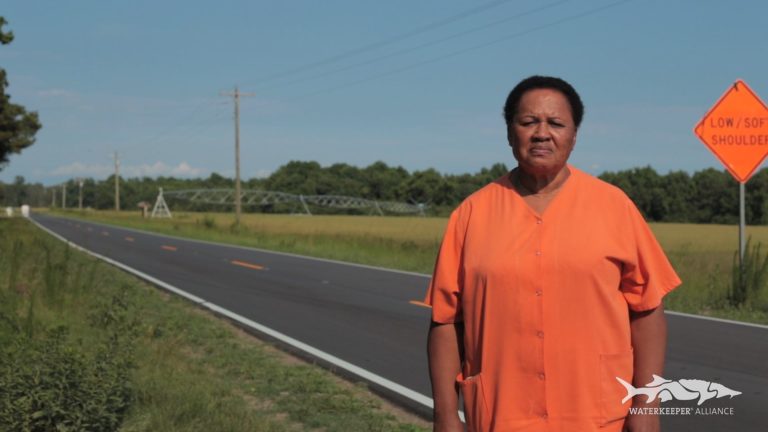With Groundbreaking Title VI Settlement Signed, North Carolina Environmental Justice Organizations Vow to Continue Their Fight
By: Waterkeeper Alliance

North Carolina environmental justice groups announced today that they reached a settlement agreement with the North Carolina Department of Environmental Quality (DEQ) of a 2014 Title VI complaint filed with the Environmental Protection Agency. The complaint, filed by the North Carolina Environmental Justice Network (NCEJN), Rural Empowerment Association for Community Help (REACH), and Waterkeeper Alliance, alleged that DEQ allowed industrial swine facilities to operate with “grossly inadequate and outdated systems of controlling animal waste” resulting in an “unjustified disproportionate impact on the basis of race and national origin against African Americans, Latinos and Native Americans.”
Under the Agreement, which was reached after an intensive 13-month long mediation, DEQ commits to new policies to ensure compliance with federal civil rights laws, including a language access program and the development of an Environmental Justice (EJ) tool to examine demographic, health, and environmental characteristics of communities impacted by DEQ policies. In addition, DEQ agreed to a number of changes in the draft of the swine general permit that will be considered in the upcoming stakeholder process for the next swine general permit. Naeema Muhammed, Executive Director of the NCEJN, recognized the groundbreaking nature of the settlement but also cautioned “At the same time, the harmful effects of the hog industry on communities in eastern North Carolina continue, and all of us involved in this struggle need to keep the pressure on. There is still a long way to go to address the harms caused by the swine industry.” “While these changes may seem technical,” added Will Hendrick of Waterkeeper Alliance, “they will begin to address air and water pollution from the swine industry.”
“For too long people living in Duplin, Sampson and other counties in the heart of hog country have had trouble breathing when they go outside,” said Devon Hall, the Co-Founder and Program Manager of REACH. “Even small changes in the permit can be important, like making clear that DEQ has authority to inspect without prior notice. It’s unacceptable that DEQ has been giving facilities advance notice before conducting an inspection, which means that the operation can just change what it has been doing and clean up before the inspector arrives.”
Hall also emphasized the importance of provisions in the settlement agreement calling for community involvement in water and air monitoring. “People who live here can walk outside, smell the problem, and see the waste running into nearby ditches and streams,” said Hall. “But we want to help document the impacts of the CAFO industry on our community. With thousands of swine operations across eastern North Carolina, the provisions in this agreement calling for monitoring may feel like a drop in the bucket, but they are a good start.”
“For too many years, the `lagoon (or cesspool) and sprayfield’ system of waste management has allowed feces and urine to blow through the air and flow from the sprayfields into our waterways and into nearby communities,” said Larry Baldwin, the Crystal Coast Waterkeeper. “There’s still a long way to go but our groups will continue the work needed. The provisions in this agreement are a step in the right direction and provide more opportunities for people in eastern North Carolina to have a voice in decisions affecting their future.”
Will Hendrick stated, “DEQ has the responsibility to ensure that these facilities operate in a way that prevents negative impacts on their neighbors. Terms proposed for the general permit stakeholder process are a start, but DEQ needs to go further in the future to protect communities. Mandatory groundwater monitoring is needed, for example, to ensure protection of vital resources.”
“Most importantly, we believe that this agreement signifies a new dynamic in the relationship between DEQ and the communities of color that are most severely impacted by the policies and decisions it makes,” noted Ms. Muhammad. “As a result of the process we have engaged with DEQ over the last three years, the needs and priorities of those communities will be at the forefront of DEQ’s considerations going forward.”
REACH, NCEJN, and Waterkeeper Alliance are committed to continuing to hold DEQ accountable—to the settlement agreement, and to DEQ’s broader mission of serving the people of North Carolina and protecting the state’s environment. The groups are represented by Earthjustice, the Yale Law School Environmental Justice Clinic, and the Julius L. Chambers Center for Civil Rights.